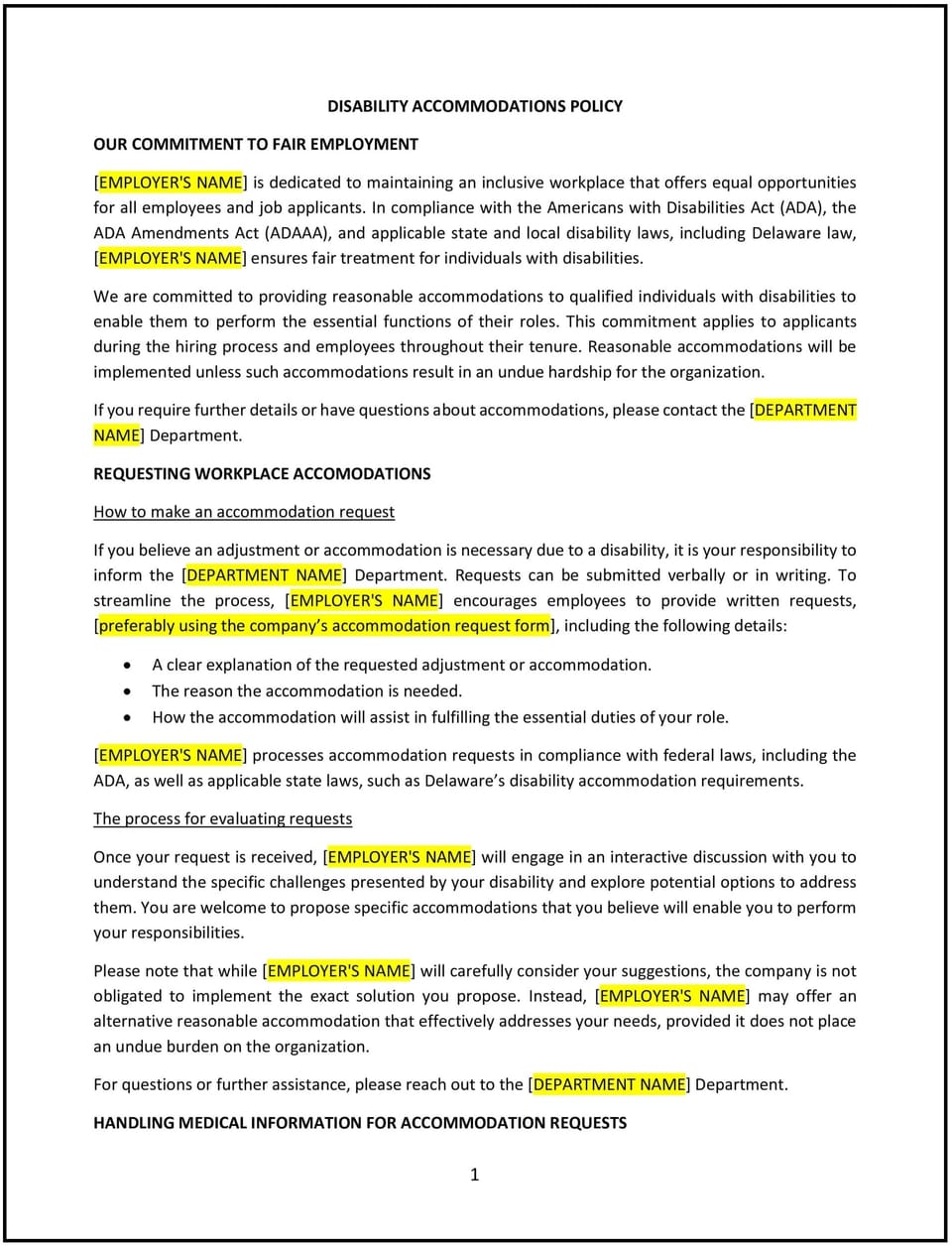Disability accommodations policy (Delaware): Free template

Disability accommodations policy (Delaware)
A disability accommodations policy helps Delaware businesses create an inclusive workplace by providing reasonable accommodations for employees with disabilities. This policy outlines the company’s commitment to complying with the Americans with Disabilities Act (ADA) and Delaware laws, ensuring employees with disabilities can perform their job duties effectively.
By implementing this policy, businesses can foster diversity, enhance employee satisfaction, and reduce legal risks.
How to use this disability accommodations policy (Delaware)
- Define reasonable accommodations: Specify the types of accommodations the company may provide, such as modified work schedules, assistive devices, or adjustments to workspaces.
- Outline the request process: Explain how employees can request accommodations, including documentation requirements and timelines for submitting requests.
- Evaluate requests: Establish a process for assessing accommodation requests, considering both employee needs and business operations.
- Ensure confidentiality: Emphasize that all information related to disability and accommodation requests will be kept confidential and shared only on a need-to-know basis.
- Train managers and supervisors: Provide training on how to handle accommodation requests and ensure compliance with applicable laws.
- Monitor accommodations: Regularly review implemented accommodations to ensure they continue to meet the employee’s needs and are effective.
Benefits of using this disability accommodations policy (Delaware)
This policy offers several benefits for Delaware businesses:
- Promotes inclusivity: Ensures employees with disabilities have equal opportunities to succeed in the workplace.
- Enhances compliance: Helps businesses align with the ADA and Delaware disability laws, reducing the risk of legal disputes.
- Improves employee morale: Demonstrates the company’s commitment to supporting employees, fostering loyalty and satisfaction.
- Reduces turnover: Retains talented employees by addressing their needs and creating a supportive work environment.
- Strengthens reputation: Positions the company as a socially responsible and inclusive employer.
Tips for using this disability accommodations policy (Delaware)
- Communicate the policy clearly: Ensure employees understand their rights and how to request accommodations.
- Provide support: Assign a designated contact person or team to assist employees with the accommodation process.
- Stay compliant: Regularly review the policy to ensure it aligns with updates to the ADA and Delaware disability laws.
- Engage in dialogue: Maintain open communication with employees to determine the best accommodations for their needs.
- Document requests: Keep thorough records of accommodation requests and the steps taken to address them.
Q: Why is a disability accommodations policy important for my business?
A: This policy ensures compliance with ADA and Delaware disability laws, promotes inclusivity, and helps create a supportive work environment for employees with disabilities.
Q: What qualifies as a reasonable accommodation?
A: Reasonable accommodations may include modifications to workspaces, flexible schedules, assistive devices, or job duty adjustments that enable employees with disabilities to perform their roles effectively.
Q: How can employees request accommodations?
A: Employees can request accommodations by following the process outlined in the policy, which typically includes submitting a written request and any necessary documentation.
Q: How does the company evaluate accommodation requests?
A: The company will assess requests based on the employee’s needs and the feasibility of implementation, considering factors like cost, operational impact, and legal requirements.
Q: How does the policy ensure confidentiality?
A: All information related to disability and accommodation requests is kept confidential and shared only with individuals directly involved in the process on a need-to-know basis.
Q: How often should this policy be reviewed?
A: This policy should be reviewed annually or whenever there are updates to ADA regulations, Delaware laws, or company practices to ensure continued compliance and effectiveness.
This article contains general legal information and does not contain legal advice. Cobrief is not a law firm or a substitute for an attorney or law firm. The law is complex and changes often. For legal advice, please ask a lawyer.


